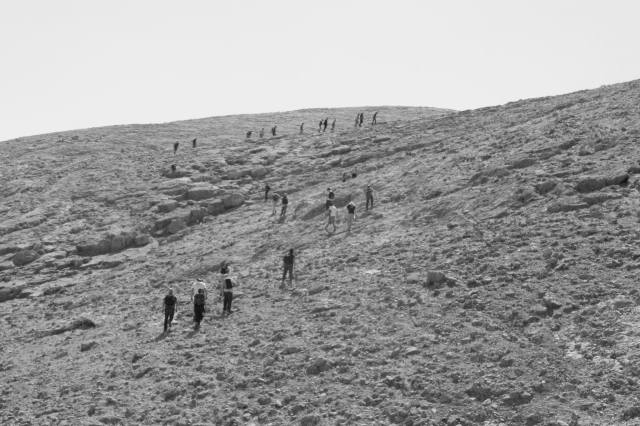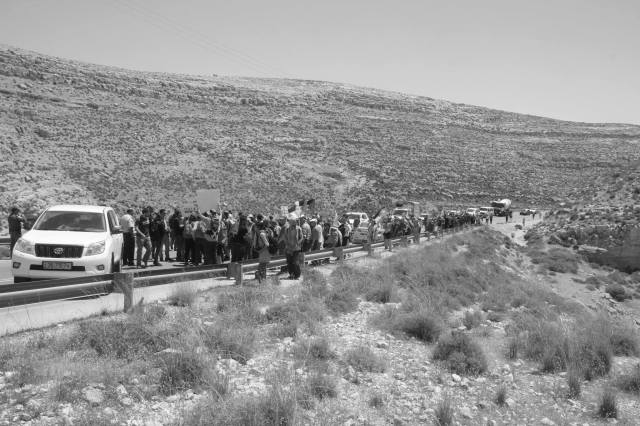On Friday 4/21/2017 shepherds from Al Auja in the Jordan Valley, Palestine were assaulted by Israeli settlers. Five solidarity activists who accompanied them were injured. A week later (4/28/2017) hundreds swarmed the hills to protest against the settlement and its violent settler outpost. Forced to act by public outrage, the police eventually evicted the outpost, and the shepherds can now access their land safely. Following is a checkered first-person account of the successful struggle those shepherds undertook.
The night after the attack. Rotem and I stay in Auja in case of a nightly raid. The unmarried young men of the hamlet sleep under the stars by the welcoming tent. Warm wind blows, shooing the mosquitoes. The world is so incredibly loud. Dogs bark hysterically all over the area. Sheep, goats, crickets, roosters, donkeys; everything brays in cacophonous symphony. I am reminded that villagers often can’t sleep through city noise. My heart beats haphazardly. Images from the attack play in my mind on loop. This phenomenon recurs every time I am subjected to violence. This time I wasn’t even there for it. I sat with the shepherds after the attack as they played the videos over and over again on their phones. The images are harrowing. A video filmed by one of the shepherds shows the activists holding a line in front of screaming settlers running towards them, like satyagrahi facing British bullets. Another video that went viral shows rocks flying all over the place. Rabbi Arik Ascherman walks away from the settlers as his back is barraged with stones. One masked settler beats him over the shoulder with a club. He keeps on walking. I imagine myself in that situation. The blood pumps in my temples as I write these words, as if I was there. Is this hyper-empathy or fear or both?
The dogs bark even louder. I begin to fear that the settlers are coming. “Rotem?” I ask the night. “What…” the night murmurs, muted by wind and pillow. “Why are the dogs barking like that?” I ask. “I dunno,” Rotem says. “If it was anything bad I guess they would get up.” The Bedouins sleeping next to us stay perfectly still. I turn to the other side and force my eyes shut. The images return. A friend bleeding behind the ear. Another with a broken arm.
The barking ensues. “’Ali?” Rotem says. “Mmm?” ‘Ali murmurs. “You hear the dogs?” “Yeah…” “You think it’s the settlers?” “I’unno, maybe…” He turns to the other side and goes back to sleep.
*
A week before the attack. It’s the first time we accompany these shepherds. The barley around their hamlet has been exhausted by now and they need to walk further up to feed their flocks. The herds know the route, and carve their own path without particular guidance, calm and agile on the steep hills. Crickets materialize out of the earth to jump away from our feet, landing with a gentle clicking sound. The undersides of their wings flash like a butterfly’s wings in fire-orange dotted in black as they scamper away. We ascend 450 meters over a 1.2 kilometer walk. We’re all panting by the time we reach the top. The herds feast on the billowing barley. The expanse of the Great Rift Valley, the Syrian-African Split, spreads wide behind us. As the tectonic plates crawl ever so slowly away from each other, underground mountains wait for their turn to rise.
Due to settler assaults, the shepherds haven’t accessed this land in over a year. Two dark figures emerge on the hill of the settlement. They disappear and return with five more. They disappear again. And again with more. By the time the grazing is done, a pack of about fifteen masked settlers armed with clubs runs towards us on the hills, screaming war cries. We spread in a line between their route and the herds. In my mind I prepare to defend myself somehow if need be. I wonder whether I should put my clown nose on. I can’t imagine they’d take a liking to my sense of humor.
150 meters away from us, they stop. We see them huddling, confused. Later we learn they thought we were cops or Shin Bet agents attempting a sting operation. One runs from the settlement over the hills to the group, probably to inform them that police has arrived at their outpost. They retreat to hide in a nearby cave. Later that day, they will attack a military patrol with stones. The soldiers will release a video of the event to mainstream media.
*
Three months before the attack. Jahalin Bedouins of Auja contact us and ask for accompaniment. They relate stories of settler brutality, assault, and theft of livestock. The police and occupation administration turned a blind eye.
Late winter. Palestinian families crowd the area of Ein Al Auja, bathing in the ancient spring. Yellow flower beds decorate its green flanks. Tapped by no less than three heavily guarded hydraulic facilities that funnel the water to the nearby settlements, the fountain will dry completely by April. We are served green Babunaj tea on a cool afternoon, freshening and soothing at once. The Jahalin express a desire to stand up for their rights and begin to struggle for their livelihood. They know that if they won’t do so, they will eventually be forced off this land. It will be a long, arduous way, they know.
Ta’ayush activity is focused on the north of the Jordan Valley at the moment, but there’s a willingness to come down here to the center as well if it stabilizes up north and more people get involved. What if the settlers try to beat you up? A shepherd asks. We’re prepared for that possibility, and have experience in dealing with it, we reply.
*

Activists swarm the hills of Auja after the protest. (04/28/2017, Amir Bitan)
The week after the attack. The assault exploded over the media with activists taking the moral high ground. It wasn’t easy to force mainstream media to report what actually happened. Our spokespeople had to threaten that they would never work again with outlets that erroneously report the usual “clashes erupt between leftists and settlers” that we’re so bitterly familiar with. The Israeli left shakes off its malaise to rally in support of us. Hundreds who come with the intention to demonstrate in front of the settlement of Kochav Hashachar, are halted by police fifteen kilometers away from the destination, and block a highway for the duration of the protest.
Dozens join to accompany shepherding afterwards. A soldier runs to the top of the hill waving a closed military zone order, but his unit is so outnumbered. They are powerless in stopping us from accessing the land. The settlers show up on the hills in small numbers and stay far away.
The commander calls for an Arabic speaking soldier to come up and tell the Bedouins to get out of the area. The shepherds think he’s Bedouin from the Negev. He lifts the shepherds’ hats to take photos of their faces and threatens them that they will be arrested at night. One of the activists doesn’t take it. He stretches to his full towering height and bellows, “Who are you to threaten people in this way!” He calls the commander, “Your soldier is out of line – control him!” This has an impact, and that soldier remains in the backdrop for the duration of the afternoon, no longer abusing his power.
The grazing session ends peacefully as the herd has its fill. No one is hurt or arrested. The settlers stay away. I descend feeling empowered.
*
At the end of the demonstration, after Rabbi Ascherman speaks, the local shepherds from Auja are invited to share their story. They contemplate the invite at length, worried about putting themselves out there and risking repression from Israeli authorities. Finally, they decide that if the Taayush activists risk their skin for their sake, they should stand up as well. ‘Ali Jahalin comes up to speak with his brother supporting behind and Rotem translating from Arabic. He talks about how they started getting assaulted and robbed around 2008, how the authorities did nothing for them, and how they finally decided these past months to call up people from the peace movement to support them. He says he’s grateful for their support and intends to stay steadfastly on the land. This is a historic moment for the Bedouins in Al Auja, the Jordan Valley, Palestine, as they bravely rise to resist their oppression, risking everything for their freedom. I am heartened and moved to action. Rotem invites the crowd to join beyond the protest and help in accompaniment. More people volunteer than can fit the designated transit.

The demonstration being blocked by police 15 km from Kochav Hashachar. (04/28/2017, Amir Bitan)
*
It’s a risk to accompany shepherds in Al Auja these days, but the more people join, the safer we are. If you are in the region, please join us on Friday, and help these people stay on their land.
To join Ta’ayush activity or donate: taayush.org
If you liked this post, you might want to take a look at this one too: Hesitant Hope: One Year In The Jordan Valley
